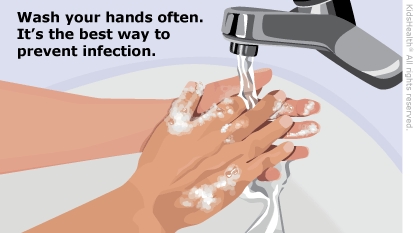Fever and Neutropenia: How to Care for Your Child
Neutropenia (new-truh-PEE-nee-uh) means that the body has a low number of neutrophils (a type of white blood cell). These cells help the body fight infection. Cancer itself or chemotherapy can cause neutropenia. Having a low number of neutrophils can make someone more likely to get an infection. Your child had a fever and a low neutrophil count. Your child got antibiotics to fight infection, and the fever has gone down. Your child's neutrophils are now at a safe level.


-
If your child seems sick, take a temperature in the mouth (oral) if possible, or under the armpit (axillary). Don't take a rectal (in the bottom) temperature while your child has neutropenia.
-
Don't give your child medicine for fever (acetaminophen or ibuprofen) unless instructed to by your child's health care team.
-
Don't give your child or teen aspirin. It is linked to a rare but serious illness called Reye syndrome.
-
To prevent infection:
-
Make sure your child and other family members carefully wash hands and use antibacterial soaps or hand sanitizers.
-
Keep your child away from people who are ill and avoid crowds.
-
Ask about safe ways to handle food to prevent bacteria from growing and making your child sick.
-
Don't let your child share drinking glasses or utensils.

Your child:
-
develops a fever, which means there is:
-
shows signs of infection, such as:
-
sweating, shaking, or chills
-
coughing
-
sores in the mouth
-
redness, swelling, or sores on the skin
-
diarrhea
-
pain or trouble peeing (urinating)
-
feeling sick or very tired
-
is sleepy or cranky and can't be comforted
Your health care provider may tell you to take your child to the ER for some of these problems.

Your child:
-
can't be awakened
-
has a seizure
Call 911 and tell emergency responders that your child has neutropenia.

What is the ANC? The ANC, or absolute neutrophil count, is the total number of neutrophils in a person's white blood cell count. Someone with a low ANC (less than 500) is at risk for infections.
How can parents help a child with neutropenia? Neutropenia can be very stressful for kids and their families. Your health care provider and social worker can help you and your child, especially if your child is feeling sick or is lonely from having to stay away from other people to prevent infections.